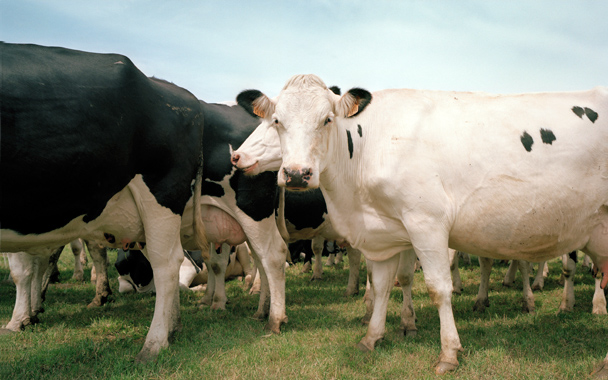Two cows are in a field. One turns to the other and goes, “I don’t like this one bit, all this talk about Mad Cow going around. I’m not down with going bananas at all.” The other munches on grass calmly. “Oh, I’m not worried about it,” she says, “because I’m an airplane. ZOOOOOM! WOOOOSHHHH!”
I stopped eating beef for a year when we found Mad Cow in our country. It wasn’t so much that I was actually afraid of getting my brains all Swiss-cheesed up, but I was protesting our government’s attitude towards it, which is, essentially, “We don’t have Mad Cow. Really. Test for it? What, you don’t trust us? What are you, some kind of terrorist?”
In retrospect, I think my boycott was a little silly. It was silly because it wasn’t really a political act—I didn’t talk about it, didn’t use it as an opportunity to share my thinking. What it really was, I think, was an attempt to opt out of a system I didn’t believe in, but only in the most convenient possible way. I’d long felt that beef—our society’s default meat choice—was boring and flavorless, so I didn’t miss it. And I didn’t stop eating other factory-produced meats, so if I was trying to vote with my wallet, really I was just putting money in IBP’s left pocket instead of its right one. If I were to be ungenerous with myself, I would call it a self-righteous cop-out.
So I stopped after a year because I got tired of my feckless, silent protest. And a funny thing happened, too: After avoiding beef for a while, my first tastes of it were amazing: bloody, mineral, animal. It hasn’t bored me since.
But now with Mad Cow back on the radar, I’m thinking again about my boycott. I’m considering doing it again, but doing it for real this time. There is a big part of me that would love to be able to say that I eat meat—happily, voraciously—but only meat that is responsibly produced. By that, I mean in terms of the animal, in terms of the environment, and in terms of the people who work so hard to raise and process the stuff.
But here’s my problem: My favorite taco truck doesn’t cook with that kind of meat, not for two bucks a taco. It’s vital to know where your food comes from, but that doesn’t just mean what farm it was raised on. It goes through the hands of cooks, and emerges the product, too, of their skills, their sweat, their culture. It’s a human process, a process in which I can’t imagine myself not participating, not wanting to engage.
So I feel like I’m in a weird place, ethically. Do I owe my allegiances to the place the food comes from, or the people whose hands it goes through? It’s hard to know which principles to prioritize, and so, at the moment, I still find myself making my choices based on my stomach, not my head.




 Pinterest
Pinterest


